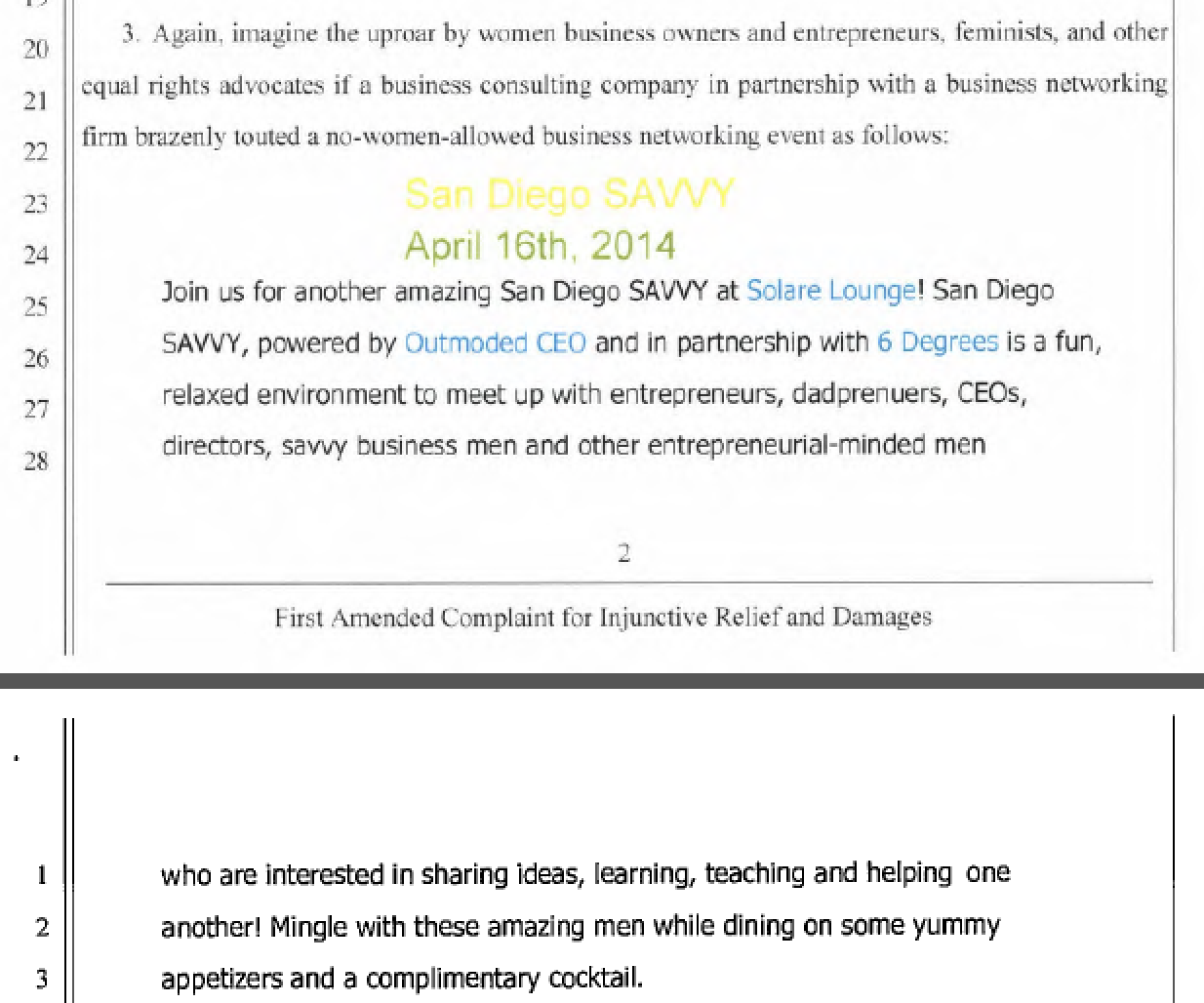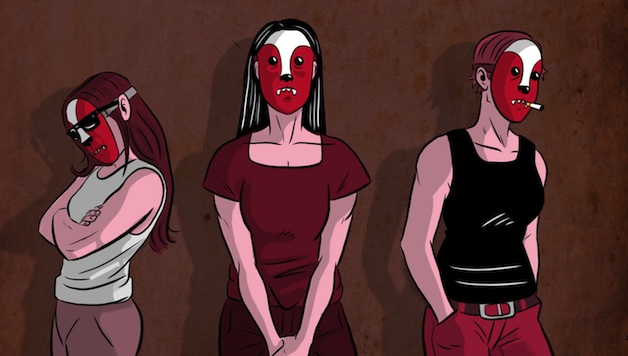
Sam72/Shutterstock
In April 2014, Stephanie Burns’ company, Chic CEO, was gearing up for a networking event at an Italian restaurant in San Diego. Chic CEO hosts online resources for women starting their own businesses, and this spring evening it had teamed up with a local networking group to throw a mixer at Solare Lounge, where women could mingle over cocktails and appetizers while talking business.
During the event, Rich Allison, Allan Candelore, and Harry Crouch appeared at the restaurant door. They had each paid the $20 admission fee, and they told the hosts they wanted to enter the event. Chic CEO turned them away, saying that “the event was only open to women,” according to the men’s version of events, explained later in a legal complaint. Within two months, the three men had filed a discrimination lawsuit against Burns and her company alleging that the event discriminated against men. They are each members of the nation’s oldest men’s rights group, the National Coalition for Men, and Crouch is the NCFM’s president.*
The lawsuit is a recent example of a trend that several men’s rights activists have repeatedly deployed in California, one made more successful by their strategic use of the Unruh Act, a decades-old civil rights law named after Jesse Unruh, the progressive former speaker of the California Assembly. The law is quite broad, outlawing discrimination based on markers such as age, race, sex, or disability. In dozens of lawsuits, several NCFM members have invoked it to allege discrimination against men by such varied groups as sports teams and local theaters. And the strategy has worked.
Since 2013, these men have used the law to file two lawsuits, and threaten several more, against groups encouraging gender diversity in tech and business, worlds that have been historically dominated by men, with women holding only about 4 percent of Fortune 500 CEO positions and making up only about 13 percent of computer engineers for the last 20 years. As the movement for more gender diversity in these fields has gained traction, some men’s rights advocates have questioned the need for such a movement at all.
“Women typically earn more than do men” in industrial engineering and “all other engineering disciplines,” Harry Crouch, the NCFM’s president, writes on the group’s website. (Census data says the opposite: As of 2013, median earnings for men in computer, science, and engineering occupations were about $13,000 more than the median earnings for women.) “Surely, networking mixers to encourage more men to take part in those fields are needed, but not at the exclusion of women,” wrote Crouch.
Critics in legal circles contend that these lawsuits appear to be as much about making an easy buck as they are about defending aggrieved men.
The NCFM members’ lawsuit alleged that by holding a networking event marketed toward women, Burns and Chic CEO were in fact illegally discriminating against men. The 2014 complaint filed in San Diego Superior Court focused on the event’s marketing, noting: “Imagine the uproar by women business owners and entrepreneurs, feminists, and other equal rights advocates if a business consulting company in partnership with a business networking firm brazenly touted a no-women-allowed business networking event as follows.” It illustrated the point with a rewritten version of the ad for the event, substituting references to women with men.

(Later in the complaint, the last names of Facebook COO Sheryl Sandberg and Yahoo CEO Marissa Mayer, two of the highest-ranking women in Silicon Valley, are misspelled.)
This was not the first lawsuit these men had filed against a women’s professional group. In 2013, they sued Women on Course, a group that introduces women to golf, after the Virginia-based organization held a golf clinic and networking event at a San Diego golf club. Once more, Allison, Candelore, and Crouch asked to attend the event—this time in advance via email—and sued the organization after they were told they could not come because the event was for women.
Both Donna Hoffman, the president of Women on Course, and Chic CEO’s Burns settled with the plaintiffs for an undisclosed sum. As a result of the suit, Burns got a new job and shrunk the business she’d built over six years, suffering a “significant” financial and personal toll. (She wouldn’t elaborate on her legal costs, out of concern for potentially violating the terms of her settlement. Rava also said he could not comment on settlements due to confidentiality.) “All Chic CEO is trying to do is provide women with the information they need to get a business started,” Burns writes in an email. “Just because we help women, doesn’t mean we hurt men.”
NCFM members disagreed. They alleged that they were illegally excluded from a business opportunity that was “closed to struggling single dads, disabled combat veterans from the Iraq and Afghanistan wars, and other business men and male entrepreneurs who, just like business women and female entrepreneurs, hoped to and had the right to meet and mingle with entrepreneurs, CEOs, directors, savvy business people and other entrepreneurial-minded people.”
In response to the argument that events like Chic CEO’s help address the pay gap, Crouch wrote on the NCFM’s website that according to “the plethora of real social science research…only a minute amount of the pay gap may be due to sex discrimination.”
Alfred G. Rava—a San Diego-based attorney who is also the NCFM’s secretary and free legal consultant—has been suing on behalf of aggrieved men for more than a decade and represented the NCFM members against Chic CEO. The 59-year-old attorney has filed more than 150 sex discrimination lawsuits in the last 12 years, many citing the Unruh Act. In 2003, seven San Diego nightclubs paid Rava and Steven Surrey, a paralegal, a $125,000 settlement after they brought a series of lawsuits challenging the clubs’ “Ladies Night” and other woman-specific discounts. (Part of this sum also went to their attorney fees.)* In 2004, the San Diego Repertory Theater paid Surrey $12,000 after he wrote to it, with Rava’s help, alleging that its ticket discounts—half-priced tickets for women on specific nights—were illegal. In 2009, Rava won a half-million-dollar settlement from the Oakland A’s for a class-action suit that contested a Mother’s Day promotion where the A’s gave the first 7,500 women to arrive at the ballpark that weekend a sun hat. Rava told Mother Jones that he’s never been paid by the NCFM for his “advocacy for equality for men.” He also said he could not disclose how much money, if any, he or his clients made from various settlements over discrimination claims because the settlements are confidential.
Rava’s most high-profile victory was a sex discrimination case that, in 2007, made it all the way to the California Supreme Court. In the lawsuit, four men, including several NCFM members, alleged that the ticket prices charged by a Los Angeles restaurant and night club were discriminatory—in some instances women got a $5 discount or got in free. The issue that the Supreme Court had to decide was not whether the men were discriminated against, but whether the men had the standing to file the suit at all. The club argued they didn’t because men never asked to be charged at the ladies’ rate. But California’s Supreme Court ruled in the men’s favor, so they were free to sue the club. The NCFM members were then awarded a judgment by a lower court—but Rava says they were unable to collect because the club had gone out of business. This Supreme Court victory laid some of the legal groundwork for Rava’s recent cases against women’s professional groups.
In May 2015, Leslie Fishlock, the CEO of Geek Girl, a tech training company, got a letter from the NCFM alleging that the female-focused marketing for her upcoming Geek Girl tech conference was discriminatory. Copied on the letter were some of her conference’s biggest sponsors, including the University of San Diego and Microsoft. Fishlock was shocked, and she worried her sponsors would pull out at the last minute. They didn’t, but Fishlock says she spent thousands of dollars on attorneys to avoid a lawsuit.
“It’s a fear-based shake down strategy,” Fishlock says. “I couldn’t sleep. I worried that they would show up to my events, even though we allow guys to come. After the conference, I thought, ‘I don’t even know if I want to do this anymore.’ I shouldn’t have to live in that kind of fear.”
Since then, Fishlock has been warning other women in tech about how to tweak their marketing language to avoid the NCFM’s challenges. She says she has sent emails to “all of the women I know who have networking groups.”
The NCFM has also written similar letters to a number of other groups, including a local YMCA and a Monterey bike race, contesting woman-specific promotions. It’s unclear if Rava has been behind the drafting of all these letters, but the legal citations and lines of argument in portions of the letters are strikingly similar to those in the Chic CEO and Women on Course lawsuits. A cached page featuring the letter sent to Geek Girl on the NCFM’s website thanks Rava for his help. Rava confirms he has consulted for the NCFM about businesses that treat men and women differently, and notes that the letters are signed by the NCFM’s president, Harry Crouch.
Rava has lost cases as well, including a much-publicized suit opposing a Mother’s Day giveaway by the Anaheim Angels. But when it comes to male discrimination cases, his overall track record is impressive.
“I’m shocked that he has gotten any traction at all,” says Michael Kimmel, a professor of sociology at Stony Brook University who has written extensively on men’s rights groups. Kimmel cites the example of Roy Den Hollander, a men’s rights activist and New York attorney who has filed sex discrimination suits on behalf of men over the past decade. He sued over ladies’ nights at a number of New York nightclubs, the Violence Against Women Act, and Columbia University‘s women’s studies department. All three of these cases were dismissed.
But the Unruh Act’s protections are broad, which some say makes California fertile territory for Rava’s work. Robert Dato, an Orange County attorney who defeated Rava in the Angels case, says the act can encourage frivolous lawsuits, in part because it contains a one-sided provision requiring losing defendants to pay back the plaintiff’s attorneys fees, but not vice versa. Rava doesn’t agree that the breadth of the Unruh Act encourages sex discrimination lawsuits, in part, he tells Mother Jones, because his litigation and advocacy have led to a dearth of parties to sue. “These gender-based promotions and business practices have been virtually eliminated in California,” writes Rava in an email, “and no sex discrimination promotions or events means no sex discrimination lawsuits.” Rava told Mother Jones that he’s not working on any Unruh Act cases at this time.
California courts have suggested that Rava and his plaintiffs are exploiting the breadth of the Unruh Act to make money off settlements. They “have been involved in numerous of what have been characterized as ‘shake down’ lawsuits,'” wrote a California appeals court in dismissing Rava’s case against the Anaheim Angels. “They proclaim themselves equal rights activists, yet repeatedly attempted to glean money…through the threat of suit.” The California Supreme Court raised the same issue in its opinion on Rava’s supper club case, noting, “We share to some degree the concerns voiced by the trial court and the appellate court…regarding the potential for abusive litigation being brought under the Act.”
Rava dismisses the courts’ references to the potential shake-down nature of his lawsuits. He explains in an email that the courts are merely repeating “personal attacks” made by his opponents when the law is not on their side: “Perhaps because California’s anti-discrimination laws and the facts are so much against these serial sex discriminators and their attorneys,” writes Rava, “that in some cases the parties and their attorneys have little choice but to make personal attacks against or ‘pound’ the discrimination victims and their attorneys.”
Candelore, Allison, and Crouch are undeterred. As noted by Yahoo News and in San Diego court records, Candelore has been a plaintiff in 12 civil cases since 2011. In 10 of those 12 cases, he was represented by Rava. In nine of those, Crouch was also a plaintiff, and in eight of them Allison was a plaintiff.
But the question remains: Why have tech and business become targets for the men’s rights movement? Kimmel offered a theory.
“The STEM field has been, for better or worse, one of the last bastions of uncriticized masculinity,” says Kimmel. “You still find that in Silicon Valley. There’s a kind of crazy nerd macho where your masculinity is proved by how little sleep you get and how much work you can do. So for these men, it’s exasperated entitlement. ‘Those were our jobs; why are you taking those too?'”
Correction: An earlier version of this article misstated Steven Surrey’s job title.
Correction: The headline of this article has been revised to more accurately reflect the nature of the defendants in the lawsuits.
















